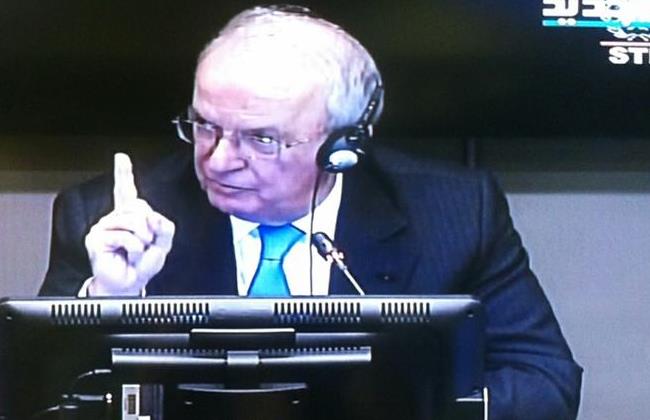Syrian regime wanted to turn Lebanon into a dictatorship, Hamade tells STL
Kareem Shaheen/The Daily Star/Nov. 21, 2014
BEIRUT: The Syrian regime intended to end Lebanon’s parliamentary democracy and transform it into a dictatorship, a campaign that led to the creation of an opposition movement aimed at curbing Syria’s domination, the Special Tribunal for Lebanon heard Thursday.
“We wanted to correct the path,” said MP Marwan Hamade, a former minister and ally of the assassinated Prime Minister Rafik Hariri, describing the evolution of the opposition movement.
Hamade, who survived a 2004 assassination attempt, was testifying at the U.N.-backed tribunal in The Hague on the fourth day of “political” testimony surrounding the breakdown of relations between Syria and Lebanon in the run-up to the 2005 Valentine’s Day bombing that killed Hariri and 21 others and plunged Lebanon into turmoil.
The STL has indicted five members of Hezbollah in connection with the attack, but is now focusing on Syria and tensions between Damascus and Hariri, which prosecutors say may clarify the motive behind the killing.
Hamade’s latest testimony focused on the aftermath of the re-election of pro-Syrian President Emile Lahoud, a deeply unpopular move that was forced upon Hariri and his allies after alleged direct threats from Syrian President Bashar Assad. The testimony also addressed some of the fallout from U.N. Security Council Resolution 1559, which had called for the withdrawal of foreign forces from Lebanon and the disarmament of militias, and was seen as a threat to Syria’s presence and Hezbollah’s arms in Lebanon.
Hamade said Hariri intervened with foreign envoys from the U.S. and other Western countries urging them to “appease” Assad, telling them that rushing forth with the terms of the resolution could destabilize Lebanon.
Hamade and members of his bloc had already resigned from government because they did not wish to attend Cabinet sessions headed by the re-elected Lahoud.
He said Hariri intended to form another government of national unity to stabilize the country following the Lahoud controversy, after getting indications the Syrians would allow him to stay on as premier. When he resigned later, Lahoud instead picked Omar Karami as premier.
Hamade described how Syria interfered in the Lebanese parliamentary elections, forcing Hariri to field pro-Syrian candidates in his parliamentary lists in 2000. Druze leader Walid Jumblatt was asked to do the same but declined.
Hamade said the Syrian campaign was ultimately aimed at concentrating power and turning Lebanon from a parliamentary democracy into a dictatorship, formalizing the occupation.
He described the development of the opposition movement known as Qornet Chehwan, which brought together disparate members of the movement and was backed by then-Maronite Patriarch Nasrallah Sfeir. The gathering included Nayla Mouawad, the widow of assassinated President Rene Mouawad, Nassib Lahoud, MP Boutros Harb, journalist Gebran Tueni and members of the Shiite intelligentsia.
Hariri did not yet have a role in the group at the time.
Hamade described how the group evolved into the outspoken Bristol Gathering, which included civil society and union members, and whose meetings were eventually attended by Hariri allies.
The formation of an opposition movement that Hariri ultimately joined is a key element of political developments in Lebanon in the run-up to his assassination, and one that prosecutors said they intend to explore in detail in testimony. The conspiracy to assassinate the former premier allegedly began about a month after his fallout with Assad.
Hamade’s testimony was cut short due to a medical problem with the prosecution’s senior trial counsel, Graeme Cameron, who was questioning him. The MP will fly back to Beirut and return to The Hague to testify when the court resumes hearing political testimony on Dec 3.
Presiding Judge David Re told Hamade that he could resume his political activities but ought to not discuss the content of his testimony with others. Hamade jokingly said he would return “unless something happens to me in Beirut.”




















